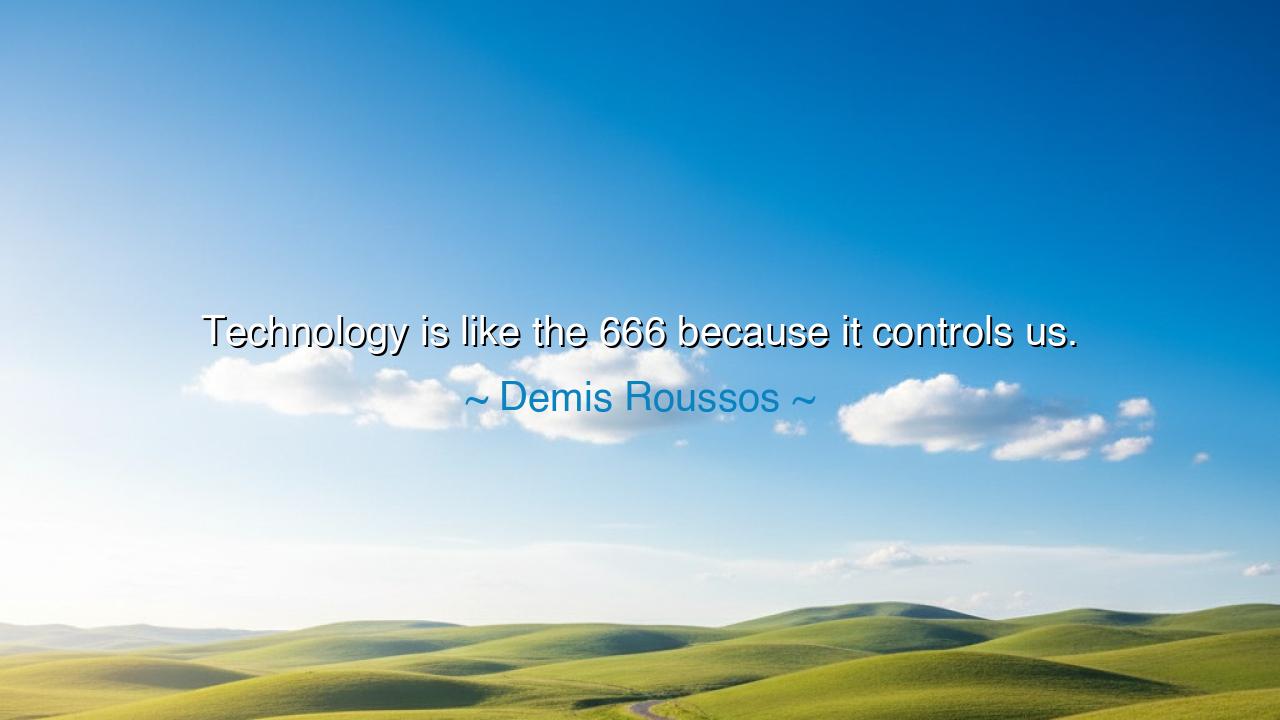
Technology is like the 666 because it controls us.






Hear the haunting words of the singer and mystic voice, Demis Roussos, who declared: “Technology is like the 666 because it controls us.” This is no light saying, no casual metaphor, but an echo of ancient warnings, where numbers and symbols carried the weight of prophecy. The 666, long feared as the mark of the beast in the Book of Revelation, is a sign of domination—of man bent under a power that governs his will, his choices, and even his soul. In likening technology to this mark, Roussos warns not against the machine itself, but against our surrender to it, against the creeping dominion of tools that once served us, now ruling us.
From the dawn of invention, mankind has sought to bend the world to his purposes. Fire, the wheel, the loom, the press—all were born to aid him. Yet in every age, when man ceased to master his creation and allowed it instead to master him, destruction followed. So it was with the Roman love of spectacle, where the arena of blood became the chain of distraction, dulling a people’s spirit until their empire crumbled. So it may be with technology in our age, when its glow and hum ensnare the eyes and hearts of billions, until men and women live not as free beings, but as servants of their own devices.
The meaning of Roussos’ words is as much spiritual as practical. The 666 is not merely a number, but a warning of what happens when human dignity is sacrificed to control. Technology, when blindly followed, can mark us as surely as any brand upon the flesh. The endless screen, the ceaseless algorithm, the constant call of machines can consume the freedom of thought, the depth of silence, the sacred rhythms of life. What was once created to assist can become an idol that dictates.
Consider the story of the Industrial Revolution. When machines first thundered in England, they promised abundance and progress. But for many, they also became chains. Children labored in mills from dawn to dusk, families were uprooted, and the rhythm of human life bent to the relentless ticking of the factory clock. Efficiency was gained, but humanity was lost. This is the shadow Roussos points to: when technology controls, it does not serve—it enslaves.
Yet his words are not a call to abandon progress, but to remain vigilant. To liken technology to 666 is not to declare it evil in itself, but to remind us that it carries the potential for domination. If man sleeps, if he gives himself uncritically to the screen, to the machine, to the system, he will awaken one day to find that his soul is no longer his own. Freedom requires discipline; mastery requires awareness. To live with technology and not under it—this is the challenge.
The lesson, then, is clear: guard your sovereignty. Use technology as tool, but never let it become master. Choose when to turn it on, and when to turn it off. Reclaim silence, contemplation, and the face-to-face presence of others. Ask yourself with each new invention: does this free me, or does this bind me tighter? For the mark of control is subtle, creeping in not with chains of iron, but with comforts too easily embraced.
Take action, beloved listener. Set limits for yourself. Fast from screens, even for a day, and taste the freedom of stillness. Seek balance: use technology to learn, to build, to connect, but refuse to let it consume the hours of your soul. Teach your children to see technology as a servant, not a master. And above all, remember that the true mark of man is not 666, but the divine spark of choice, of creativity, of freedom.
Thus the words of Demis Roussos stand as a warning sung across time: “Technology is like the 666 because it controls us.” Let them not fill you with fear, but with resolve. For the beast of control cannot reign where men and women rise with awareness, discipline, and wisdom. May you master your tools, lest they master you. May you remain free, even in an age where the machines would whisper chains into every heart.






AAdministratorAdministrator
Welcome, honored guests. Please leave a comment, we will respond soon